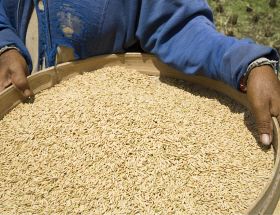 to be no commercial production of wheat or "small grains" (barley, oats, etc.) in the Philippines.
to be no commercial production of wheat or "small grains" (barley, oats, etc.) in the Philippines.As a result, the country is a major importer of milling-quality wheat and the United States is its largest supplier. Milling wheat imports over the past several years have remained fairly steady, ranging between 2.1 – 2.3 million tons per year, with the balance of total wheat imports consisting of feed-grade wheat.
Philippine paddy rice production increased 2.2 per cent from 18.0 million tons in 2012 to a record 18.4 million tons in 2013, while corn output declined 0.4 per cent from 7.41 million tons in 2012 to 7.37 million tons last year. On a July-June market year basis, MY13/14 rice and corn output increased from the previous year’s levels despite several typhoons.
Although the GPH has a goal of achieving rice and corn self-sufficiency, there are indications diversifying into higher value crops will be given more attention. As a result of this, coupled with the entry of significant rice imports (legitimate and undocumented), rice production in MY14/15 is expected to decline from the previous year’s level. Corn output, on the other hand, will likely increase in MY14/15, enhanced by increased use of superior quality planting seeds and GPH investment in postharvest infrastructure.
Milling wheat imports are likely to increase, albeit in marginal terms, through MY14/15 due to the positive economic prospects and the expanding Philippine population. While milling wheat is expected remain the top US agricultural export to the Philippines, expanded sales are expected to be constrained by imports of Turkish flour.
Turkish flour imports accounted for an estimated 7 per cent of overall milling wheat imports in 2013, unchanged from the 2012 level. Millers in the region allege Turkey is dumping flour, and claim CIF quotes for Turkish flour are in many cases less than CIF wheat prices.
MY13/14 feed wheat consumption in the PSD table (see link below) has been pared down slightly to reflect less-than-expected imports for the year. A modest increase in feed wheat demand is predicted in MY14/15 in order to replenish stocks, as well as to meet the expanding feed demand of the growing livestock and poultry industries.





